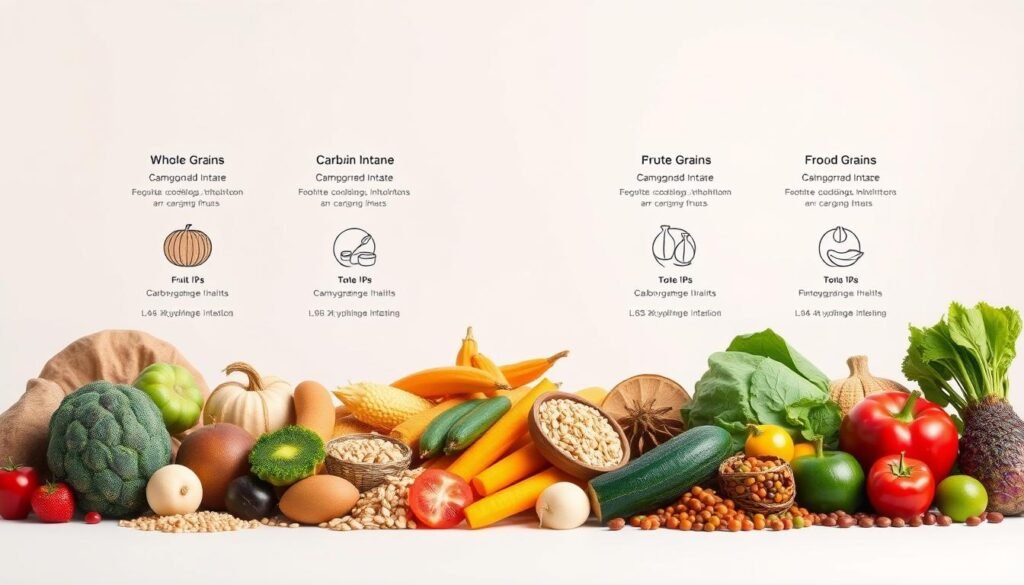Carbohydrate Calculator
Our bodies rely heavily on carbohydrates as a primary source of energy throughout the day. They fuel our workouts, power our movements, and support brain function. Understanding the role of carbs in our diet is crucial for achieving various health and fitness goals.
Using our calculator, you can determine your optimal daily carb intake based on individual factors such as age, weight, height, and activity level. This personalized approach helps you manage your weight, enhance athletic performance, and maintain overall health.
Key Takeaways
- Understand the importance of carbohydrates for energy and overall health.
- Learn how to use our calculator to determine your daily carb needs.
- Discover the benefits of personalized carb calculations for your diet.
- Find out how tracking carb intake can support weight management and athletic performance.
- Implement effective carb tracking in your daily life for better health outcomes.
Understanding Carbohydrates and Their Role in Your Body
Understanding carbohydrates is key to managing your energy levels and overall health. Carbohydrates, or carbs, are a fundamental component of our diet and play a crucial role in our bodily functions.
What Are Carbohydrates?
Carbohydrates are one of the three primary macronutrients that serve as the body’s preferred energy source. They are composed of sugar molecules that come in various forms. As “Carbohydrates are the body’s primary source of energy, fueling our brains and muscles”, it’s essential to understand their structure and function. Most dietary carbs come from plants, such as fruits and vegetables.
Why Your Body Needs Carbs
Our bodies rely on carbs to function properly. They break down into glucose, which fuels cellular processes and brain function. The importance of glucose for the body cannot be overstated, as it’s a critical energy source. As noted by a leading nutrition expert,
“Glucose is the primary source of energy for the brain and muscles, making carbohydrates an essential part of a healthy diet.
Different Types of Carbohydrates
Carbohydrates come in different forms, including simple carbs (monosaccharides and disaccharides) and complex carbs (polysaccharides). Simple carbs are quickly digested, causing a rapid increase in blood sugar levels. Complex carbs, on the other hand, are digested slowly, providing a more sustained energy release. Understanding the different types of carbs and their effects on the body is vital for making informed dietary choices.
How Our Carbohydrate Calculator Works

Our carbohydrate calculator is designed to provide you with a personalized carb intake plan based on your specific needs and goals. This tool is invaluable for anyone looking to manage their weight or optimize their carb intake for athletic performance.
The Science Behind Carb Calculations
The calculator uses the Mifflin St. Jeor equation, a widely respected formula, to determine your basal metabolic rate (BMR). This equation is considered the “gold standard” of calorie calculators by many nutritionists and dieticians. By understanding your BMR, we can provide a tailored macronutrient calculator that meets your specific needs.
Factors That Affect Your Carb Needs
Several factors influence your carb needs, including activity level, weight, age, and gender. Our intake calculator takes these factors into account to provide recommendations that are right for you. For instance, athletes or individuals with a high activity level may require more carbohydrates to fuel their energy needs.
Interpreting Your Calculator Results
Once you’ve input your information into our calculator, you’ll receive a personalized carb intake plan. This plan is designed to help you achieve your health and fitness goals, whether that’s weight loss, maintenance, or gain. Understanding and adjusting to these recommendations is key to achieving your desired outcomes.
Recommended Carbohydrate Intake for Different Goals
Understanding the ideal carbohydrate intake is essential for maximizing your progress toward your specific health objectives. Different fitness goals, such as weight loss, muscle gain, or maintenance, require tailored carbohydrate strategies.
Carb Targets for Weight Loss
For individuals aiming for weight loss, reducing carbohydrate intake can promote fat loss while preserving muscle mass. A daily carbohydrate target that is lower than maintenance levels can help achieve this goal. Typically, this involves consuming between 50-150 grams of carbs per day, depending on activity levels and individual needs.
Carb Targets for Muscle Gain
Those looking to build muscle require a higher daily carbohydrate intake to support muscle recovery and growth during resistance training. The target for carb intake in this case is generally higher, often above 2-3 grams per kilogram of body weight, to ensure sufficient energy for workouts and recovery.
Carb Targets for Maintenance and General Health
For individuals focusing on maintenance or general health, the carbohydrate intake should support overall energy needs without leading to weight gain or loss. Monitoring blood glucose levels and adjusting carbohydrate consumption accordingly can help maintain stable energy and support health. A balanced diet with quality carb sources is crucial.

Adjusting carbohydrate timing around workouts can further optimize performance and results. Understanding how different carbohydrate intake levels affect blood glucose levels and overall health is key to achieving your goals.
How to Count Carbs in Your Diet
Understanding how to count carbs in your diet is essential for maintaining a healthy and balanced lifestyle. Counting carbohydrates helps you make informed food choices and manage your daily intake effectively.
Reading Food Labels for Carb Content
One of the easiest ways to count carbs is by reading food labels. Food labels provide detailed information about the nutritional content of a product, including total carbohydrates, fiber, and sugar. When reading labels, look for the total carbohydrate content, which includes sugars, fibers, and other carbs.
Tracking Carbs in Whole Foods
Tracking carbs in whole foods, such as fruits and vegetables, can be more challenging since they don’t come with labels. However, you can use resources like the U.S. Department of Agriculture’s Food Composition Database to find the carb content of various whole foods. With practice, you’ll become more familiar with the carb content of common foods.
Tools and Apps for Carb Counting
There are many tools and apps available that can simplify the process of counting carbs. These digital tools allow you to track your daily carb intake, log your food, and even scan barcodes for quick access to nutritional information. Some popular apps include those that provide comprehensive databases of foods and their corresponding carb content.
Carbohydrates in Popular Diet Plans
Different diets handle carbohydrates in unique ways, affecting blood glucose levels and insulin response. This variability is crucial for individuals with specific dietary needs or restrictions, such as those with type 1 and type 2 diabetes, or athletes requiring sustained energy.
Low-Carb and Ketogenic Diets
Low-carb and ketogenic diets restrict carbohydrate intake to promote fat burning and weight loss. By limiting carbs to typically 15-25% of total calories, these diets induce a metabolic state called ketosis, where the body burns fat for fuel instead of carbs. This approach can be beneficial for weight loss and improving blood glucose control.
Moderate-Carb Approaches
Moderate-carb diets, such as the Mediterranean diet and DASH diet, balance macronutrient intake, deriving 40-50% of calories from carbohydrates. These diets emphasize whole, nutrient-dense foods and have been associated with various health benefits, including improved heart health and sustainable weight management.
High-Carb Diets for Athletes
High-carb diets, where 60% or more of calories come from carbohydrates, are often adopted by endurance athletes to maximize energy stores and enhance performance during prolonged exercise. Carbohydrate loading is a strategy used to ensure that muscles are fully stocked with glycogen, delaying the onset of fatigue.

Understanding how different diets affect carbohydrate intake and blood glucose levels is crucial for managing health and performance. Whether you’re managing diabetes or optimizing athletic performance, choosing the right dietary approach to carbohydrate intake can make a significant difference.
Conclusion: Making Carb Counting Work for You
As we conclude our exploration of carbohydrate calculators, it’s clear that managing carb intake is crucial for achieving various health and fitness goals.
Our carbohydrate calculator is designed to help you determine your optimal carb intake based on your individual needs and objectives. Consistency in tracking carbohydrate intake is key, but it’s equally important to remain flexible and adjust your intake based on your personal response and changing needs.
Focusing on the quality of carbohydrates consumed, rather than just the quantity, is vital. Whole food sources are generally superior to processed options, providing better nutritional value and supporting long-term health and weight management.
Before making significant changes to your carbohydrate intake, especially if you have medical conditions like diabetes, we recommend consulting with healthcare professionals. They can provide personalized recommendations tailored to your specific health condition and medical history.
By effectively managing your carb intake and using our carbohydrate calculator, you can support your long-term health, weight management, and athletic performance goals as part of a balanced nutrition plan.
FAQ
What is the ideal daily carb intake for weight loss?
The ideal daily carb intake for weight loss varies depending on factors such as activity level, age, and overall health. Generally, a low-carb diet restricts carb intake to 50-150 grams per day, while a more moderate approach targets 150-250 grams per day. We recommend consulting with a healthcare professional to determine the best carb intake for your specific weight loss goals.
How do I calculate my daily carb needs for muscle gain?
To calculate daily carb needs for muscle gain, we consider factors such as body weight, activity level, and training intensity. Typically, athletes require 2-3 grams of carbs per kilogram of body weight per day to support muscle growth and recovery. Our carb intake calculator can help you determine your specific needs.
What are the best sources of complex carbs for sustained energy?
Complex carbs are rich in fiber, vitamins, and minerals, making them an excellent energy source. We recommend whole foods like whole grains, fruits, and vegetables, which are rich in complex carbs. Examples include brown rice, quinoa, sweet potatoes, and leafy greens like spinach and kale.
How do I track my carb intake effectively?
To track carb intake effectively, we suggest using a food diary or a carb tracking app. Reading food labels and understanding serving sizes can also help. Additionally, measuring your food portions and tracking your daily intake can help you stay on target.
Can a high-carb diet be beneficial for athletes?
Yes, a high-carb diet can be beneficial for athletes who engage in high-intensity, long-duration activities. Carbs provide energy for workouts and support muscle recovery. We recommend that athletes consume 3-5 grams of carbs per kilogram of body weight per day, depending on their specific training needs.
How does fiber content impact carb counting?
Fiber is a type of carb that is not fully digested by the body. When counting carbs, we recommend subtracting fiber content from total carb counts, as it has a minimal impact on blood glucose levels. This is known as “net carbs.”
What is the impact of processed foods on carb intake?
Processed foods often contain added sugars, refined flour, and other unwanted ingredients that can negatively impact carb intake. We recommend focusing on whole, unprocessed foods to maintain a healthy carb intake and overall diet.

